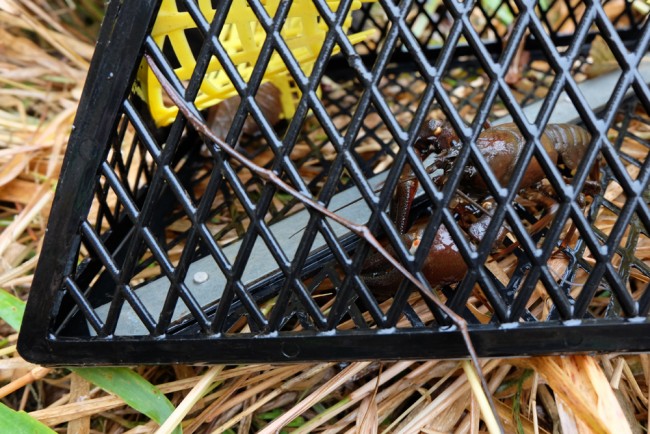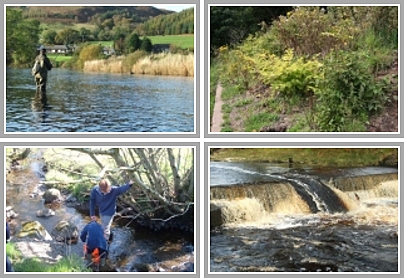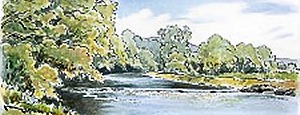Following up on a report by a local angling club, that an American Signal Crayfish (ASC) had been seen in a local river, we obtained the necessary licences to commence trapping in an attempt to confirm the sighting. At the moment, we won’t confirm the river or the location but can confirm that the River affected is in the Ayr catchment.
Unfortunately, after a single night’s trapping (under licences issued by Marine Scotland Science and SNH), we can now confirm that ASC are present in Ayrshire and this, apart from being very disappointing is potentially highly damaging to native fish populations in this river and downstream. All the relevant authorities have been notified and we will prepare a full statement on this in due course but felt it important to alert anglers to their presence immediately to prevent further spread. It is illegal to trap these creatures without a Government issued license and anyone caught doing so will be reported to the Procurator Fiscal by the DSFB bailiffs or Police Scotland. Don’t be tempted to try this as there’s a risk that you may spread them further causing even more damage. Catching and eating trap caught crayfish in Scotland is illegal.
The local angling club are aware of our findings and are extremely concerned. How they got there is unknown and we won’t speculate further at present but there’s no doubt that this has been a deliberate and reckless act.
Moving live ASC is illegal, a wildlife crime and highly irresponsible. They cause damage to fish and invertebrate populations, destroy habitat and will downgrade a system due to them being an invasive non native species. Wherever possible, anyone caught introducing these or invasive species will be prosecuted under the Wildlife and Natural Environment (Scotland) Act 2011.
To prevent the accidental spread of these and other non native species, anglers and river users are encouraged to follow a few simple biosecurity measures:
Check – once you are ready to leave a fishing spot, always check your equipment for any non native species (plant or animal). Pay particular attention to nets where crayfish could be trapped in the folds.
Clean – before you leave the riverbank, clean any equipment at the water’s edge, removing mud, plant material from equipment and boots. Once at home, disinfect any equipment that’s been in contact with the water using a proprietary product such as Virkon.
Dry – following cleaning and drying, thoroughly dry all equipment before reuse. Most aquatic organisms won’t survive long out of water so this is especially important.
Anyone finding what they believe to be an American Signal Crayfish in Ayrshire should immediately kill it by a firm stamp on it’s head and body. This is a legal requirement as it is an offence to release it (accidentally or deliberately) and is the recognised method of dispatch in this situation. Photograph the the body or better still bag it and then contact the Trust immediately or SEPA. We will then notify the necessary authorities. In this instance, we commend the angling club for quickly alerting us to the report and we will provide as much support and information on this species as possible to help their members prevent the spread further.

For scale a bunch of keys were added to the bucket. This is a mature adult male of approximately 41/2 inches in length
Sadly once these crayfish become obvious, it is usually too late to get rid of them and in any case, in anything but a very small burn or stank/pond, eradication has never been achieved successful yet.
This thoughtless act will deplete stocks of trout and salmon and other native fish for centuries to come unless someone develops an acceptable method of control. There has been limited work done to develop a suitable method but as yet, there’s really nothing we can do to get rid of them.




Hi Stuart. Where in the Ayr system was this crayfish discovered?
We aren’t revealing the location at present as we are still in the middle of trapping to find out the scale of the problem. In time, we will publish what information we and SNH and SEPA feel appropriate.
Shouldnae be too hard to find out. It’s a shame you feel you have to treat folk in this way, but thanks anyway.
Danny, I don’t understand your complaint. There are issues that you may not have considered such as land and riparian values etc. and it wouldn’t be correct for us to state where this is taking place until we are able to present well researched facts to those that may have to consider how the problem should be managed in future. I suggest that you will have to accept our judgement on this. As there shouldn’t be any anglers fishing over winter, I can’t see what difference it will make to have to wait a few weeks for information.
I must confess to knowing relatively little about this issue, other than that it presents a grave situation. I understand that there has been a degree of success in containing the crayfish population of the Clyde to the river’s upper reaches. Do you envision any of the techniques employed on that river to be possibles for the river Ayr?
http://www.snh.org.uk/pdfs/publications/commissioned_reports/no.%20020.pdf
Danny,
until we know the extent of the problem, it is too early to speculate on any containment measures. We will know more by the end of this month.
Yeah, I understand boxes have to be ticked, and this is not your fault, and that you don’t deserve any flak for it. Like many others who have a strong attachment to the river, this is a matter of great concern and I naturally want to keep as informed as possible. Good luck with yr efforts to control and hopefully eradicate these things.
All the best…d
We don’t sit here under any misconceptions…. the public are out there to keep us well grounded and focussed but when I read the content of this link I was frankly disgusted by the ignorance of one person in particular who hides behind a pen name to take unwarranted pot shots at the Trust and me personally for not doing enough to control the crayfish that we found this week. Internet warriors such as Hemmy, that hides behind his pen name whilst throwing criticism around as though they were going out of fashion are laughable. Thanks to all the others that pointed out his comments were unwarranted and led to him making a feeble retraction. I will be making my own thoughts known in due course.